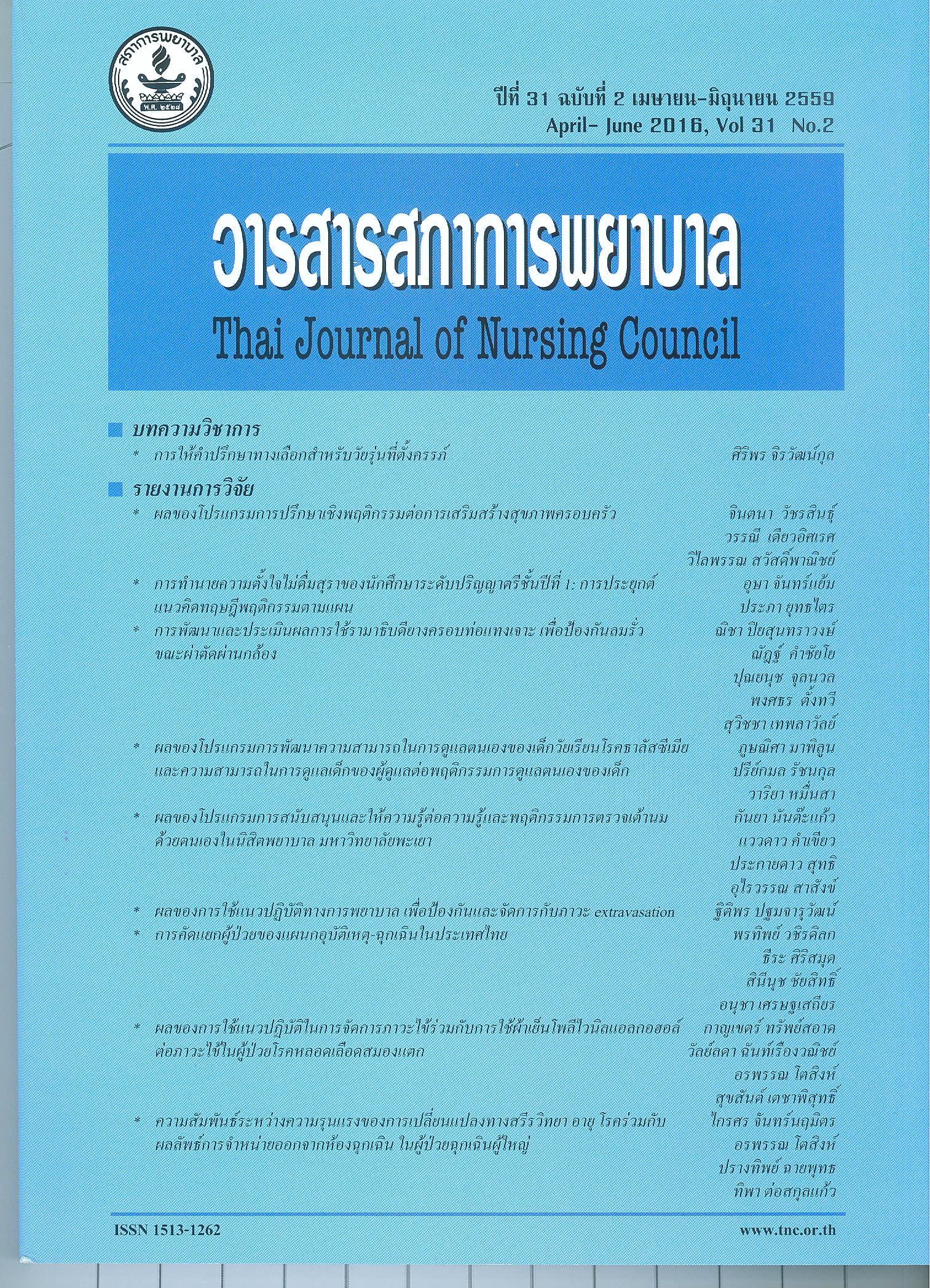ผลของโปรแกรมการพัฒนาความสามารถในการดูแลตนเองของเด็กวัยเรียนโรคธาลัสซีเมีย และความสามารถในการดูแลเด็กของผู้ดูแลต่อพฤติกรรมการดูแลตนเองของเด็ก
Keywords:
เด็กวัยเรียนโรคธาลัสซีเมีย ผู้ดูแล ความสามารถในการดูแล พฤติกรรมการดูแลตนเอง, school-age children, thalassaemia, caregivers, caregiving ability, self-care abilityAbstract
วัตถุประสงค์ของการวิจัย: เพื่อศึกษาผลของโปรแกรมการพัฒนาความสามารถในการดูแลตนเองของเด็กวัยเรียนโรคธาลัสซีเมียและความสามารถในการดูแลเด็กของผู้ดูแลต่อพฤติกรรมการดูแลตนเองของเด็ก
การออกแบบการวิจัย: การวิจัยกึ่งทดลอง แบบสองกลุ่มวัดก่อนและหลังการทดลอง
การดำเนินการวิจัย: การวิจัยครั้งนี้ กลุ่มตัวอย่างคือ เด็กวัยเรียนโรคธาลัสซีเมียและผู้ดูแลเด็กที่มารับบริการในโรงพยาบาลสองแห่งในจังหวัดเชียงใหม่ แบ่งเป็นกลุ่มทดลองจำนวน14 คู่ ทำการศึกษาที่โรงพยาบาลแห่งที่ 1 และกลุ่มควบคุมจำนวน 15 คู่ ทำการศึกษาที่โรงพยาบาลแห่งที่ 2กลุ่มควบคุมได้รับการพยาบาลตามปกติ กลุ่มทดลองได้รับโปรแกรมพัฒนาความสามารถในการดูแลตนเองของเด็กวัยเรียนโรคธาลัสซีเมียและความสามารถในการดูแลเด็กของผู้ดูแล จำนวน 3 ครั้ง แต่ละครั้งห่างกัน 4 สัปดาห์ เก็บข้อมูลก่อนทดลองและหลังทดลองระยะเวลา 12 สัปดาห์ โดยใช้แบบสัมภาษณ์พฤติกรรมการดูแลตนเองของเด็กวัยเรียนโรคธาลัสซีเมียวิเคราะห์ข้อมูลทั่วไปด้วยสถิติเชิงพรรณนาและเปรียบเทียบความแตกต่าง ระหว่างกลุ่มทดลองและกลุ่มควบคุม โดยใช้สถิติ independent T-test และเปรียบเทียบความแตกต่างก่อนและหลังทดลองของกลุ่มทดลอง และของกลุ่มควบคุม โดยใช้สถิติ paired T-test
ผลการวิจัย: ภายหลังการทดลอง พบว่า ค่าเฉลี่ยคะแนนพฤติกรรมการดูแลตนเองของเด็กวัยเรียนโรคธาลัสซีเมียในกลุ่มทดลองสูงกว่าก่อนควบคุมอย่างมีนัยสำคัญทางสถิติ (p<.01) และผลต่างค่าเฉลี่ยคะแนนพฤติกรรมการดูแลตนเองของเด็กวัยเรียนโรคธาลัสซีเมียในกลุ่มทดลองสูงกว่ากลุ่มควบคุมอย่างมีนัยสำคัญทางสถิติ (p<.01) แสดงให้เห็นว่าโปรแกรมดังกล่าวมีประสิทธิภาพในการส่งเสริมพฤติกรรมการดูแลตนเองของเด็กวัยเรียนโรคธาลัสซีเมีย
Objective: To examine how the self-care development programme for thalassaemic children and for their caregivers could affect school-age thalassaemic children’s self-care behaviour.
Design: Two-group experimental research, with a pre-test and a post-test.
Implementation: This study was conducted on a sample of 29 pairs each consisting of a thalassaemic child and a caregiver. The 29 thalassaemic children were being treated at 2 hospitals in Chiang Mai province. Of the 29 pairs, 14 were put into an experimental group and treated at one hospital and the other 15 in a control group and treated at the other hospital.
The control group received standard treatment. The experimental group, on the other hand, participated in the self-care development programme designed for thalassaemic children and their caregivers. The programme was implemented 3 times at 4-week intervals. Data were collected 12 weeks before and 12 weeks after the experiment, through an interview form focusing on thalassaemic children’s self-care behaviour. The data were analysed using descriptive statistics. Differences between the experimental group and the control group were examined using an independent t-test. Finally, both groups’ pre-test and post-test outcomes were compared using a paired t-test.
Results: After the experiment, the thalassaemic children in the experimental group displayed a significantly higher average self-care behaviour score than their control group counterparts (p < .01). This has proved the programme’s efficacy in promoting self-care behaviour in school-age thalassaemic children.
Recommendations: It is recommended that this programme be used to develop both thalassaemic children’s and their caregivers’ self-care ability
Downloads
References
Pimlak J. The prevalence of Thalassemia carrier and risk of a couple having a child with severe thalassemia in Thailand. Journal of Health 2013; 36(2):36-9. (in Thai)
Theera T.Prenatal control of severe thalassemia. [Internet].2013 [Cited 2015 march 11]. Available from: http://www.med.cmu.ac.th/dept/obgyn/
Bulletin of the Thalassemia club Thailand 2012; 21(3): 7-8.
Kasmanee M. The role of nurses in supporting the health care of children with thalassemia. Journal of Nursing and Education 2013; 6(1): 2-11. (in Thai)
Jittima S. Patient care thalassemia.I-San. Journal of Internal Medicine 2007;6(3):152-5. (in Thai)
Atchara T, Thanyachai S. Beta thalassemia and new treatments. Bulletin of the Thalassemia club Thailand 2007; 16(3): 7-8. (in Thai)
Worawan T. Thalassemia. Bangkok: Siriyod; 2003. (in Thai)
Cakaloz B., Cakaloz I., Polat A., Inan M.,& Oguzhanoglu NK. Psychopathology in Thalassemia major. Acta Paediatr Jpn 2009; 51(6): 825-828.
Gharaiben H., Amarneh BH, ZamZamSZ.The psychological burden of patients with beta thalassemia major in Syria. Acta Paediatr Jpn 2009; 51(5): 630-6.
Wassana H. Case study Childrens with thalassemia in Chonburi Hospital.[Master of Nursing Thesis]. Bangkok: Mahidol University; 2002. (in Thai).
Ratip, S., & Modell, B. Psychological and sociological aspects of the thalassemia. Semin Hematol 1996;33 (1): 53-65.
Aydinok Y, Erermis S, Bukusoglu N, Yilmaz D, et al. Psychosocial implications of Thalassemia Major. Acta Paediatr Jpn 2005; 47(1): 84-89.
Sudjai S. Quality of life of school age children with chronic illness. [Master of Nursing Thesis]. Bangkok: Mahidol University; 1998.(in Thai).
Autthiya N. Effect of self-help group on child care behaviors of caregivers having school-age children with Thalassemia in Surathani hospital. [ Master of Nursing Thesis]. Songkla: Prince of Songkla University; 2007. (in Thai).
Suksiri P.Problem of Caring for Thalassemic Children in Thailand: A study of mother's experiences in Udornthani Province.[Doctor of Philosophy Thesis]. Khonkhaen: Khonkhaen University; 2004. (in Thai).
Naparin N. Relationships between perception of Thalassemia, Selected basic condisioning factors and self-care behaviors of the adolescents with Thalassemia.[Master of Nursing Thesis]. Khonkhaen: Khonkhaen University; 2010.(in Thai).
Choladda N.The effect of learning program through a group process and cartoon storybook to self-care behavior in school age children with Thalassemia. (Master of Nursing Thesis]. Khonkhaen : Khonkhaen University; 2010. (in Thai).
Pronsri B. Effects of teaching program using group process, on self-care behaviors in school age children with Thalassemia.[ Master of Nursing Thesis]. Khonkhaen : Khonkhaen University; 2003. (in Thai).
Maneerat S. Factors influencing self-esteem of school-age children with Thalassemia. [Master of Nursing Thesis]. Songkla: Prince of Songkla University; 2004. (in Thai).
Somjit N. Self-care: Art and Science of Nursing. Bangkok: V.J. print; 2001. (in Thai)
Pornpimol N. Family experience on caring children with Thalassemia. [Master of Nursing Thesis].Phitsanulok: Naresuan University; 2009. (in Thai).
Napassawarn K. The effect of self-help group on childcare behaviors and maternal stress in thalassemic children's mothers.[ Master of Nursing Thesis]. Chonburi: Burapha University; 2002. (in Thai).
Supaporn M. Effect of supportive-educative nursing system on maternal care behavior and self-care behaviors of school age children with Thalassemia.[ Master of Nursing Thesis]. Bankok: Chulalongkorn University; 2008. (in Thai).
Orem, Dorthea E. Nursing Conceps of Practice.5th ed. St. Louis: Mosby; 1995.
Churairat K. Effects of a program promoting self-care agency on the self-care behaviors of school-age children with allergic rhinitis and dependent care behaviors of their caregivers.[Master of Nursing Thesis]. Bankok: Thammasat University; 2011. (in Thai).
Cohen, J. Statistical power analysis for the behavioral sciences 2nd ed. NJ : Lawrence Erlbaum; 1988.
Kasmanee M. Effect of self-efficacy enhancement program on health promoting behaviors of school aged patients with Thalassemia. Journal of nursing science and health 2012; 35(4):12-20. (in Thai).
Freud, Sigmund. A General Introduction to Psychoanalysis. New York: Boni and Liveright; 1920.








